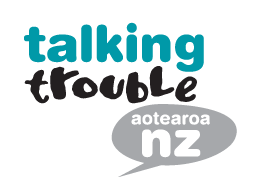My whānau and I need help
-
How We Help
Speech-language therapists try hard to make their sessions relaxed, friendly and fun. They will try to see you in the best place for you.
-
Speech Language Therapy
Speech-language therapists (SLTs) are interested in communication – listening, understanding what people are saying, and talking. They can help figure out what might make speaking and understanding tricky for you or your family member.
-
How Can I Help My Child?
If you are worried about a child’s communication, it can often help to talk to an SLT or seek an assessment. You are an amazing resource for supporting your child to develop communication skills.
How we help
Speech-language therapists (SLTs) try hard to make their sessions relaxed, friendly and fun. They will try to see people in the best place for them - whether at home, school, work, or somewhere else. They like to find out what the person thinks about their own communication and what they think gets in the way or helps them. They find out about anything that might have affected communication when the person was a baby or young child, and what might be getting in the way now. They might ask questions about how things are going in learning situations or when the person has to listen carefully or talk to others.
The SLT might sit down and do some tasks with the person to figure out how they are able to listen, understand and use words and sentences. That might involve using pictures or special books or activities. They might go along to watch how things are going in school or when the person is talking or listening to other people.
They sometimes write a report or communication passport to explain what is affecting communication and how to help.
SLTs sometimes see children or young people regularly. Sometimes they might only see the person once or twice.
Speech- language therapy
Speech-language therapists (SLTs) are interested in communication – listening, understanding what people are saying, and talking. They can help figure out what might be making speaking and understanding tricky. They often have ways to make communicating easier for people. They understand how communication often impacts on other aspects of people’s lives, like how they feel, how they behave, how they learn, or their identity and culture. SLTs think that it is very important that people can talk in whatever language is important to them and their family, and they know being bilingual or multilingual is positive.
SLTs are not interested in ‘speaking properly’ or with a special accent. Instead, SLTs are interested in people being able to say what they want to say and be heard by others.
Speech-language therapists are highly trained professionals who have been taught about different things that can affect someone’s communication skills. Those might be things that the person was born with or things that happened later on in someone’s life.
SLTs in the TTANZ team have had special training in a wide range of communication difficulties including those that can happen when people have things like Autism (ASD), Fetal Alcohol Spectrum Disorders (FASD), Attention Deficit Hyperactivity Disorder (ADHD), and hearing difficulties. They have also had training in working with people who have had a difficult time during childhood or in their family or who find managing behaviour and emotions difficult.
SLTs often work in a team with other professionals. They might work with teachers or other educators; health professionals like doctors, nurses, occupational therapists or physiotherapists; or social workers or mentors. They try to help others in the team understand how to communicate with the child or young person so that everyone can get their work done as easily as possible.
How can I help my child?
If you are worried about a child’s communication, it can often help to talk to an SLT or seek an assessment. You are an amazing resource for supporting your child to develop communication skills.
These websites give lots of ideas for ways to help children and young people learn and use words and become stronger communicators.
